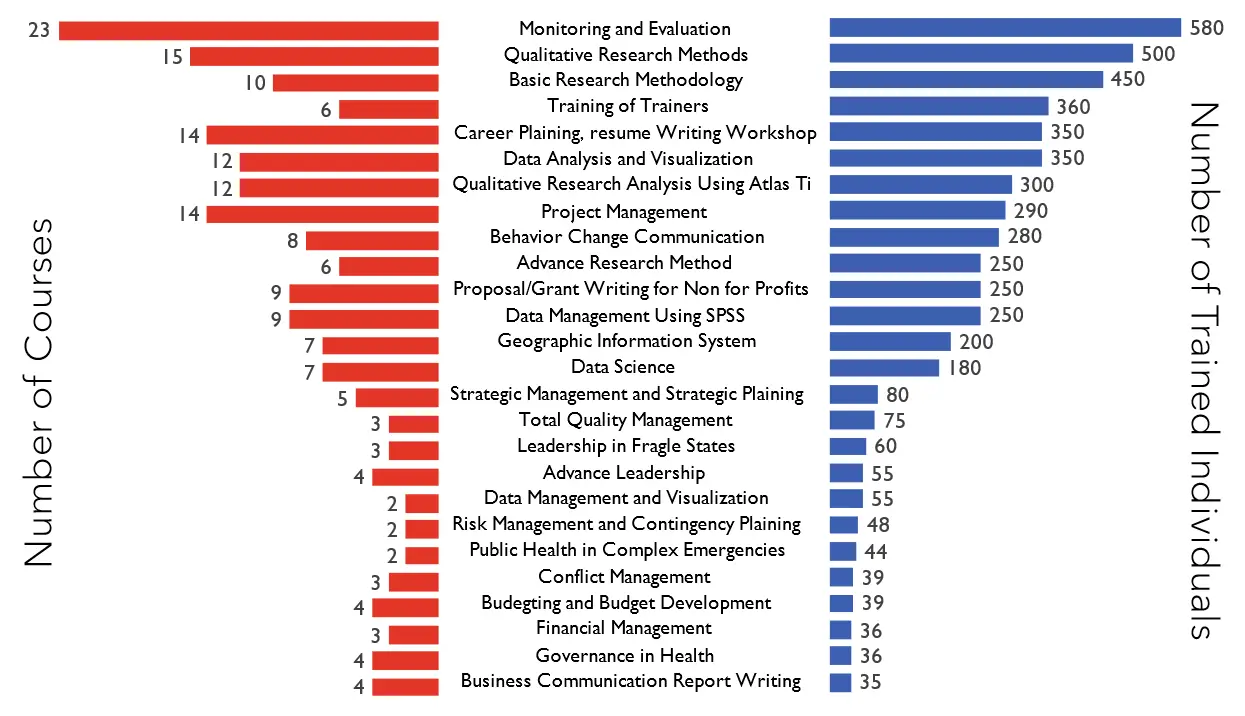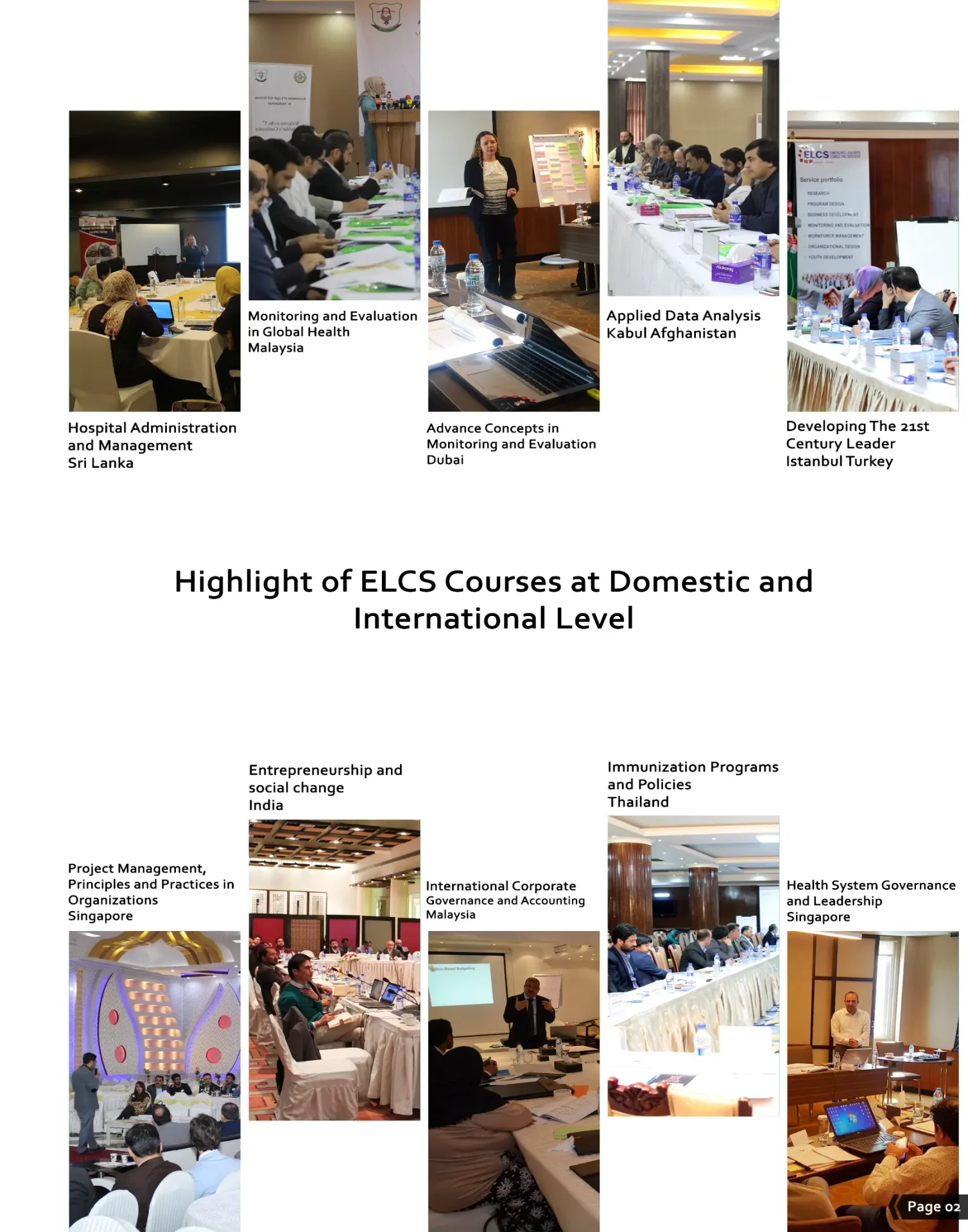PDC - Profile
Professional Development Center
The goal of the Professional Development Center is to empower individuals and organizations through high-quality training, capacity-building initiatives, and tailored professional development programs. By enhancing skills, fostering continuous learning, and promoting best practices, the center aims to cultivate a workforce capable of driving innovation, improving performance, and contributing to the sustainable development and success of their communities and industries.
In today’s constantly evolving world, we are presented with increasingly complex challenges that require adept and skilled professionals to lead various sectors and organizations. The importance of having qualified individuals who possess the necessary skills and competencies to navigate the complexities of the modern workplace is more crucial than ever. Recognizing the pressing need for quality and effective capacity development programs, Emerging Leaders Consulting Services (ELCS) established the Professional Development Center in 2017. This initiative builds upon the success of the past decade and aims to enhance our capacity building programs to better provide to the evolving demands of the professional landscape.
Our Professional Development Center (PDC) organizes planning and end of project retreat programs both in Afghanistan and abroad. The programs offered by PDC are designed to provide participants with the latest knowledge in various fields and encourage them to think about important issues facing the world today. Through PDC programs, participants have the opportunity to address real-world challenges and improve the professional skills required in today’s competitive job market. By combining theoretical and practical training, the program helps individuals develop the technical and management skills necessary to successfully overcome challenging tasks in development work.
Moreover, our training courses are developed by considering the most effective approaches from around the world and supported by scientific research. These courses cover a wide range of sectors, such as health, education, private sector growth, public health, emergencies, environment, data science, mining, agriculture, and the food industry. We customize the courses according to the unique requirements of the organizations and individuals attending, providing up-to-date content that is relevant to their specific country settings. So far, Emerging Leaders Consulting Services (ELCS) has successfully designed and conducted training using diverse methods in countries across South and Central Asia, as well as the Middle East, including Afghanistan.
In our training programs, we take a thoughtful approach to ensure that our training is effective, efficient, and targeted towards specific learning goals. We employ a backward design approach, which means we begin by clearly defining what participants should learn and accomplish by the end of the training. This allows us to customize the content, activities, and assessment methods to align with the desired learning outcomes.
Starting with the end goals in mind helps that we develop a well-organized training program that directly matches the skills and knowledge participants need. This approach enables us to create assessments and evaluation methods that effectively gauge whether participants have reached the intended learning objectives.
Afghanistan Overview
Afghanistan witnessed a marked influx of money in the form of foreign aid since 2001. Besides other sectors the higher education sector attracted unprecedented attention from the bilateral donors and development partners. Most of the efforts were geared towards revitalizing the broken higher education system that was greatly affected by the several years of war and armed conflict. Afghanistan’s higher education once model in the region, suffered tremendously as a result of war and social unrest.
Besides losing its human capital, the industry suffered from disruption in the education and a damage to the infrastructure. Further, the curriculum in most of the higher education institutions remained unchanged due in part to the lack of capacity and lack of attention by the policy makers. When the intervention of the international community back in 2001, while the higher education sector was put at the fore front of the development agenda, the reform efforts were not in line with the country’s ground realities. As such, the reform led by development partners focused on addition of new diploma programs, training of faculty and to some extend curriculum and institutional reform. Over the years, several projects are implemented supported by key development partners with some tangible results.
Today, we witness a large number of faculty being trained outside the country in multiple disciplines. There is marked increase in the number of higher education institutions but public and private that led to higher number of enrollment of girls and boys in higher education institutions across the country. infrastructure for most of the higher education institutions were either refurbished or newly built. Reference labs including science labs, computer labs and other support services were part of the reform agenda during the almost two decades. Meanwhile equipment and other machinery were purchased and distributed across universities of higher education in the country to support teaching and learning activities. faculty members were trained and exposed to contemporary teaching and learning methodologies.
Despite great achievements over the years, institutions and structural deficiencies still affect the higher education industry in the country. While the MOHE has set out a strategic plan for the next 10 years, the plan is not a reflection of the country’s ground realities. Curriculums are not meeting the growing marked demand for new skills and competencies from the graduates. Most of the higher education institutions still lack strategic vision to guide reform and development efforts towards more responsive institutions of higher education. While several faculties were trained outside the country through scholarship programs, the training was not in line with the needs of the departments or relevant faculties.
Afghanistan saw marked reduction in flow of aid money post collapse of the Afghan government in August 2021. This lack of funding flow to the country has daunting impact on the country’s economy and local population leading to economic downturn, halt or disruption of social services and poor socioeconomic status of the Afghan population. The situation is compounded by persistent drought, protracted conflict, loss of employment and opportunities for livelihood, pushing many families into poverty.
On the other hand, a change in population dynamics across the country including growing number of IDPs and returnees will challenge the humanitarian actors to respond more effective to the crisis in the country. Overall, the conditions are not favorable for the Afghan population. UN agencies and humanitarian actors express deep concern over deteriorating and dire humanitarian situation in the country. Lately, aid agencies and humanitarian actors reported that over 28 million Afghans live in dire conditions and are in grave need for humanitarian assistance.
Concurrently, a change in funding modality including disbursement mechanism has challenged most of the humanitarian actors to adapt with donor requirements. Given engagement of new actors to manage development and humanitarian funds with different mandates and compliance measures would require NGOs to adapt to these new guidelines. Couple with this is the way project are designed and managed. Additionally, engagement of multitude of stakeholders with varying expectations makes the operating environment more complex.
Meanwhile, capacity of staff including knowledge of the humanitarian situation and competency to respond to complex emergencies is tested. While Afghanistan saw an unprecedented rise in the number of educated Afghans during the past twenty years, the country doesn’t have an established cadre of trained professionals in conflict and humanitarian emergencies to deal with the situation. Further, the challenge to deal with the requirements of new funding modality and skills to lead operationalization of humanitarian response are factors that would determine pace and success of humanitarian response in the country.
In summary, institutional deficiencies, lack of capacity at different levels, outdated management practices including poorly structured curriculums and inadequately prepared graduates characterizes the higher education industry in Afghanistan. Building on past gains, the higher education industry and consultancy firms would require a new thinking and vision that is aligned with advancements in technology, regional connectivity and most importantly Afghanistan’s realities. The market in today’s Afghanistan demand.
ELCS is acutely aware of the current market situation in Afghanistan and is committed to delivering services that align with the evolving needs of our clients. In response to the significant changes since August 2021, we have tailored our consultancy services to address the critical capacity development requirements of NGOs and INGOs operating in this challenging environment. By conducting thorough political, security, and needs assessments, we ensure our interventions are both relevant and effective. Our focus on building trust through local partnerships, providing tailored training, and implementing robust monitoring and evaluation frameworks ensures that our support is sustainable and impactful. ELCS remains dedicated to empowering organizations with the skills and resources necessary to thrive and make a meaningful difference in Afghanistan.
PDC Differentials
Strategic Partnerships:
We cultivate strategic partnerships with leading academic institutions, international organizations, and local stakeholders.
Local Expertise & Engagement:
We prioritize local capacity building by training and employing Afghan trainers, with support from over 1,000 standby professionals nationwide.
Market-Based:
Understanding market dynamics, ELCS offer solutions that are practical and relevant to the current economic context.
Strategic and Results Oriented:
ELCS focuses on delivering strategic insights and tangible outcomes that drive impactful development.
Client Centered:
Prioritizing client needs, we tailor our services to meet specific objectives and expectations.
Innovative Digital Solutions:
ELCS is committed to pioneering new methods and technologies to enhance the effectiveness of our projects.
Outcome Oriented:
ELCS ensure that investments yield maximum benefits, focusing on efficiency and cost-effectiveness.
Backward Design of Training:
We focus on identifying desired outcomes first and then working backward to design the training content and activities that will achieve those outcomes.
The Servivces PDC Provides
ELCS team brings over a decade of experience in instructional design including curriculum development and course design. Working with key development projects in Ministry of Higher Education, Ministry of Education and other education institutions, selected members of ELCS team have been involved in curriculum reform efforts at the national level. This included curriculum reform efforts at Kabul Medical University undertaken by USAID and World Bank supported projects including the Higher Education Project (HEP) and Strengthening Higher Education Project (SHEP). Working with HEP, selected members of ELCS team led curriculum reform efforts at Kabul Medical University including design of a Master of Public Health Program. Meanwhile, ELCS team members have been involved in reform efforts for midlevel professionals including midwifery, nursing, allied health. Working with international organizations including USAID/REACH, Aga Khan University and University of Massachusetts, selected members of ELCS team work with other partners to develop and establish Accreditation System for midwifery and nursing program in the country. They were involved in development of education and accreditation standards for the two professions.
ELCS is one of the largest providers of intensive training courses for government, international organizations, bilateral donors, private sector and civil society organizations in Afghanistan. Drawing from international best practices and scientific evidence, the courses target different sectors including, health, education, environment, mining, construction, hotel management, and agriculture and food industry. The courses are tailored to the specific needs of client institutions in addition to the growing market demand for specific skills in each sector. Participants attending these courses will gain firsthand knowledge of the issues and master hands-on skills in the topics presented in each course. Faculties for each course are highly qualified and competent, bringing many years of practical experience in their related field.
ELCS organizes exchange program targeting education, development, civil society and private sector institutions across different sectors. Specifically, the company targets faculty members, university and higher education institution officials, development workers and members of the civil society. The programs are developed and organized with partner universities in different countries including USA, India, Turkey, UAE, Uzbekistan, Malaysia and Sri Lanka. To date, ELCS has organized numerous exchange programs for faculties and senior management from different higher education institutions and international organizations. The programs are customized to the specific needs of the client institutions and are jointly prepared with the host institutions. Program content include, cultural orientation, meetings with officials from the respective institutions, technical seminars, exposure and site visits
Many organizations and institutions organize planning and end of project retreats. The events are often organized at restaurants and in some instances outsourced to third party institutions. Realizing the need for delivery of quality and client centered services and to support institutions in organization of these important events in professional manner, ELCS is launching this new service line. Bringing several years of experience, ELCS offers professional event management services to development partners, government institutions and private sector organizations inside Afghanistan and at the international levels. ELCS offers both technical and administrative support, while managing these events. The package can be adjusted for small and large groups.
Afghanistan has become the epicenter of pilot projects and development models. In pursuit of building local institutions and to ensure delivery of quality social services, different development models have been applied across different sector. The scope of application has varied from small scale to large national scale. While some have proved effective, there is lack of documentary evidence regarding the impact of these other interventions. To better inform application of these models and to discuss their application and sustainability, ELCS organizes technical seminars. ELCS will bring subject matter experts from different sectors to discuss development issues in different sectors. The purpose of these seminars are to promote the culture of evidence base discussion and open development issues for debate. Bringing experts from the field, ELCS organizes these seminars to tackle development and humanitarian issues affecting Afghanistan. These seminars will allow for identifying best practices from the different sectors that would support and inform reform efforts at the national level. Meanwhile, ELCS experts will compile and present a summary of these discussions in the form of case studies that would be published in national and international journals.
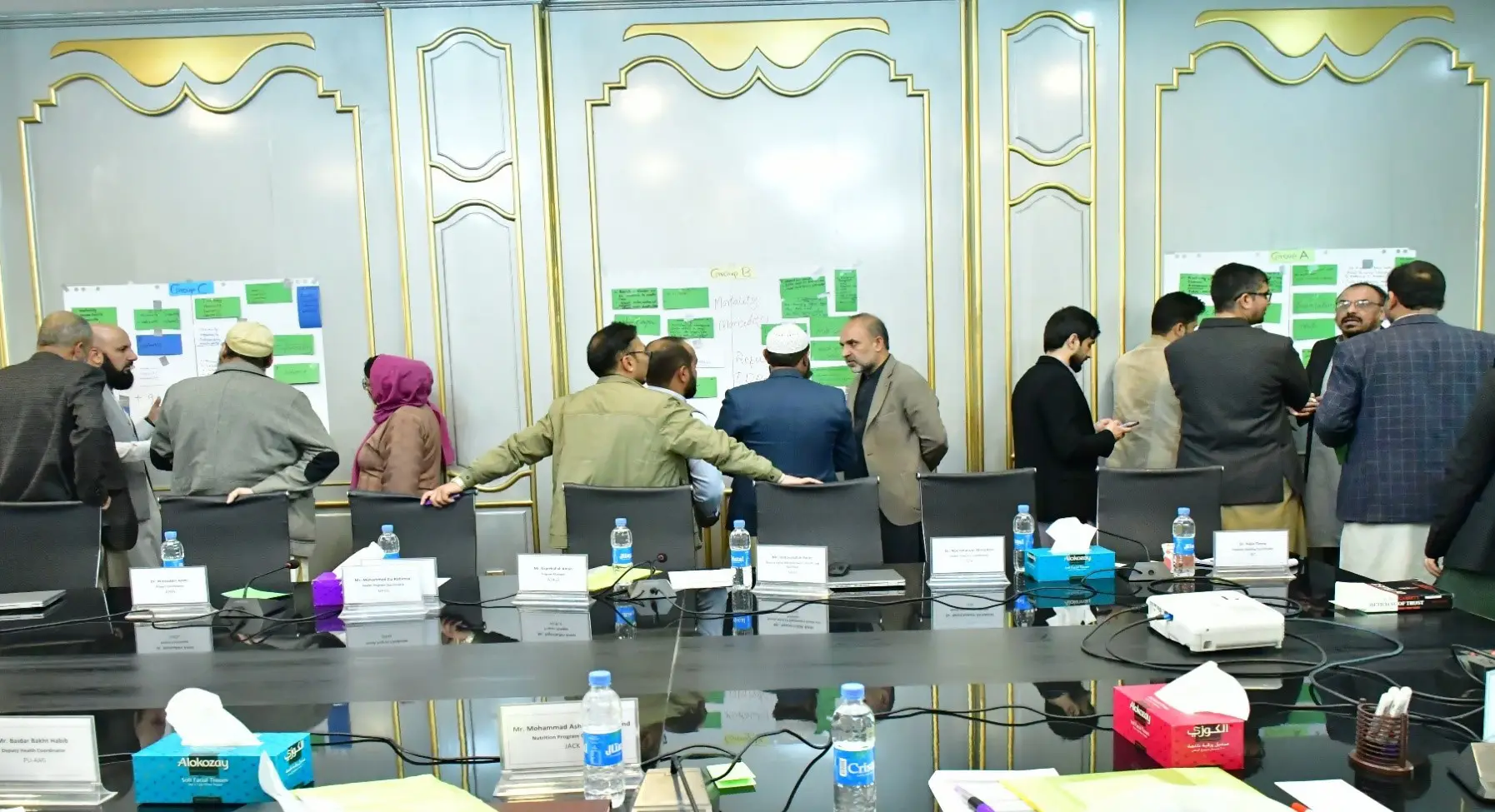
Our Training Methodology
ELCS utilizes modern teaching and learning approaches in our intensive course series. Our training methods include:
- Interactive presentations
- Group work
- Brainstorming sessions
- Debates
- Reflective learning exercises
- Individual and group projects
- Guided discussion forums
- Role play
- Lectures
Furthermore, our courses are designed based on adult learning principles. Participants are encouraged to take charge of their learning activities, while our instructors act as facilitators and mentors, guiding them throughout their learning journey. Below is a summary of the teaching and
learning activities for each course.
1- ELCS Professional Development Approach
Inspired by USAID’s model for building human and institutional capacity, ELCS focuses on professional development programs that benefit both individuals and institutions. In other words, our instructional design and curriculum developers consider the needs of both individuals and organizations. This creates a win-win situation where our programs not only enhance an individual’s job performance but also support their career aspirations. Additionally, our model helps organizations institutionalize their capacity building efforts by involving them in the design phase, ensuring their specific needs are addressed in our professional development courses. Unlike traditional training programs that only target individuals, ELCS has a proven track record of offering courses in various disciplines, training professionals in development and humanitarian sectors from diverse organizations.
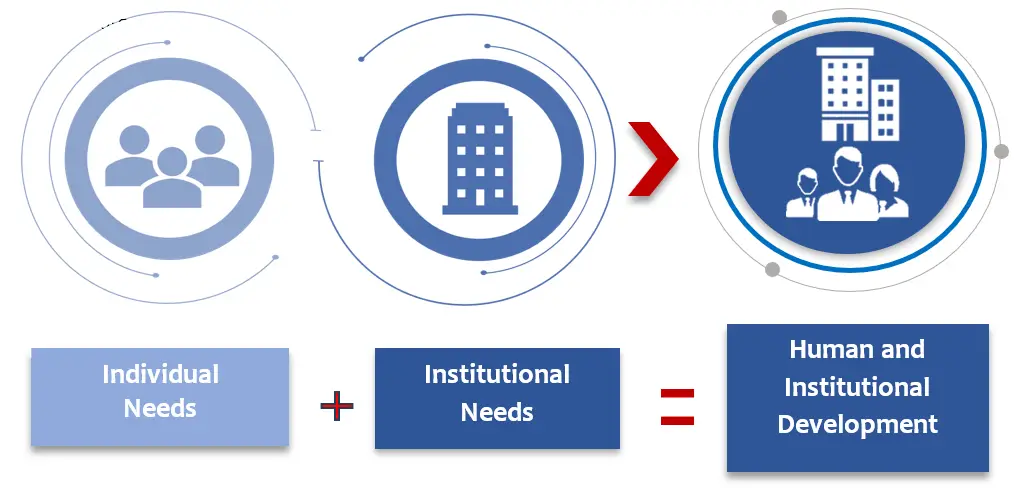
2- ELCS SPECIALIZED EXPERTISE IN COURSE & CURRICULUM DESIGN
ELCS team brings over a decade of experience in instructional design including curriculum development and course design. Working with key development projects in Ministry of Higher Education, Ministry of Education and other education institutions, ELCS team members have been involved in curriculum reform efforts at the national level. This included curriculum reform efforts at Kabul Medical University undertaken by USAID and World Bank supported projects including the Higher Education Project (HEP) and Strengthening Higher Education Project (SHEP). Working with HEP, selected members of ELCS team led curriculum reform efforts at Kabul Medical University including design of a Master of Public Health Program.
Meanwhile, ELCS team members have been involved in reform efforts for midlevel professionals including midwifery, nursing, allied health. Working with international organizations including USAID/REACH, Aga Khan University and University of Massachusetts, selected members of ELCS team work with other partners to develop and establish Accreditation System for midwifery and nursing program in the country. They were involved in development of education and accreditation standards for the two professions.
OUR TRAINER’S CAPACITY
Our pool of national and international trainers are well qualified and experienced individuals who bring over a decade experience delivering high quality training in different topics both in and outside of Afghanistan. The Company has a database of large network of trainers that knows Afghan context and delivers trainings using up to date materials involving models and frameworks from international literature and how best to apply in the workplace. Our network of trainers holds a minimum of Master’s degree bringing well over a decade experience in their areas of specialty.
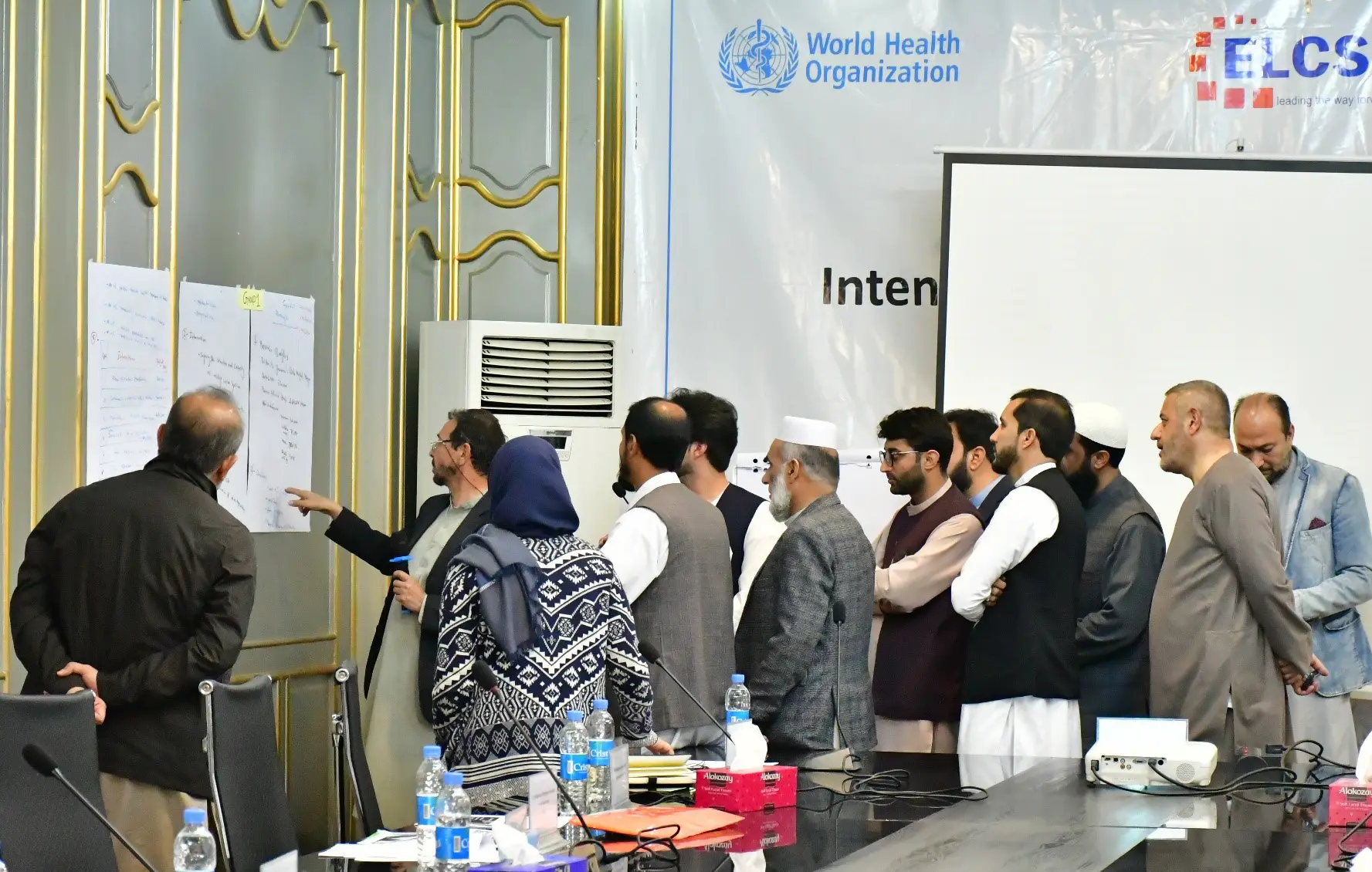
7 Steps of Our Trainin
This initial step involves conducting a thorough analysis of the training needs within an organization or among a group of individuals. It includes identifying the specific skills, knowledge, and competencies that need to be developed or improved. This may involve online assessment, interviews, performance evaluations, and other methods to gather information about the current state of knowledge and skills.
Once the training needs are identified, clear and measurable learning objectives are established. These objectives should be aligned with the identified needs and should be specific, achievable, relevant, and time-bound (SMART). Setting clear objectives helps guide the development of the training program and allows for effective evaluation of its success.
In this step, training materials are created or curated to support the learning objectives and facilitate the training process. This may include developing presentations, handouts, workbooks, online modules, videos, and other resources. The materials should be designed to engage participants and effectively convey the necessary information and skills.
The actual delivery of training program takes place in this step. Master Trainers and facilitators conduct the training sessions, whether they are in-person, virtual, or a combination of both. The delivery should be interactive, engaging, and tailored to the needs and learning styles of the participants. This step may also involve providing opportunities for practice, feedback, and reinforcement of key concepts.
After the training, an evaluation will be conducted to assess the program’s effectiveness and effiency. This may involve gathering participant feedback through surveys or interviews, assessing learning outcomes, and measuring the impact of the training on performance and behavior. The evaluation helps determine the success of the training and identifies areas for improvement.
In this stage, the results of the training evaluation will be compiled and reported to stakeholders, including donor, top management, HR, or the training department. The report may include a summary of the training outcomes, analysis of the feedback received, course proceeding, identification of strengths and weaknesses, and recommendations for future training initiatives. Reporting helps demonstrate the value of the training program and informs decision-making for future training efforts.
Following the training, ELCS mostly conducting post-training support or follow-up to ensure that the newly acquired knowledge and skills are being applied effectively in the workplace. This may involve additional coaching, mentoring, or refresher sessions to reinforce learning, address any remaining questions or concerns, and provide ongoing support for application of the training content.
ELCS Conducted Intensive Courses
